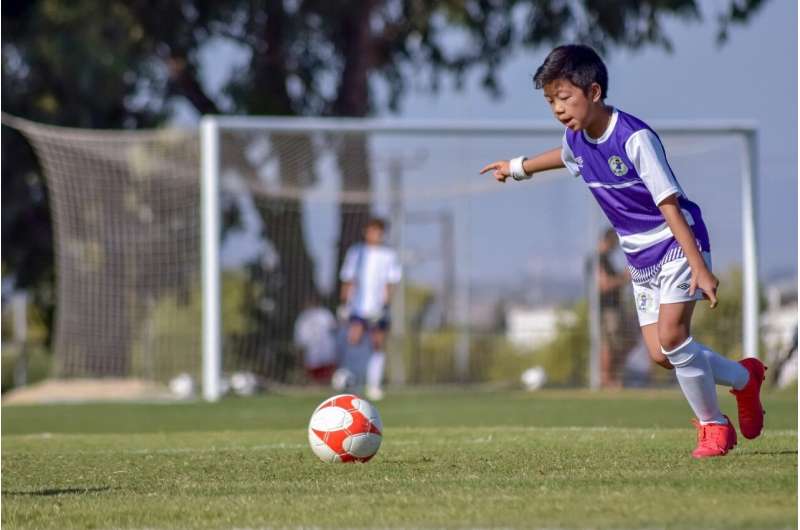This article has been reviewed according to Science X's editorial process and policies. Editors have highlighted the following attributes while ensuring the content's credibility:
fact-checked
trusted source
proofread
Study reveals key resilience behaviors in young soccer players

Supporting teammates following mistakes, being able to manage emotions under pressure and a willingness to adapt following feedback have been identified as key characteristics of resilience in youth soccer players, a study has found.
The study, which also involved NTU researchers Dr. Julie Johnston, Dr. Chris Saward and Dr. Mustafa Sarkar is published in the Journal of Applied Sport Psychology.
Sport scientists at Nottingham Trent University wanted to better understand the observable behaviors which demonstrate resilience of academy-level soccer players on the pitch.
A key feature of resilience is showing positive behavioral responses to pressure or setbacks and—while very little research has been done in this area—is considered very important for the performance and development of young soccer players.
The researchers also found that resilient players showed increased physical effort following setbacks, recovered quickly after mistakes and maintained composure under pressure.
Academy soccer typically ranges in age from under 9s to under 23s, from foundation through to professional development.
The study involved interviews and focus groups with participants working within soccer and professional soccer club academies across a range of roles, including coaching, scouting, analysis and psychology.
Participants provided a breadth of real-life examples, including video clips demonstrating youth players' resilient behaviors, before all the data was analyzed.
The researchers were able to identify a total of 36 resilience behaviors which could then be grouped into six general themes.
These were teammate support-focused behaviors; emotion-focused behaviors; effort-focused behaviors; rebound behaviors; robust behaviors and learning-focused behaviors.
It is hoped that the findings could support clubs in being better able to observe resilience in their players and identify which might benefit from development in this area.
There is also the potential for the findings to be used to support players in being more self-aware in terms of how they react and respond to setbacks, as well as by scouts as part of their recruitment practices.
The research also identified certain avoidance-focused behaviors—such as playing safe and becoming risk averse—as examples of players not demonstrating resilience during play.
"We know that resilience is a highly sought-after characteristic in players of elite level [soccer]," said lead researcher Ben Ashdown, a researcher in sport and exercise psychology in Nottingham Trent University's School of Science and Technology.
He said, "People regularly describe players as being resilient or having shown resilience, however, without really describing what they've seen.
"When a team goes one or two goals down, we might see some players 'hiding' on the pitch and not wanting the ball, blaming their teammates or showing negative body language. Others, however, can be seen putting in more effort, trying to change the situation or encouraging teammates.
"We wanted to explore what these resilience behaviors are in [soccer], to eventually allow us to observe players more objectively and support them in developing their capacity to manage the many pressures and setbacks that they face."
More information: Ben Ashdown et al, Exploring the behavioral indicators of resilience in professional academy youth soccer, Journal of Applied Sport Psychology (2024). DOI: 10.1080/10413200.2024.2361701




















